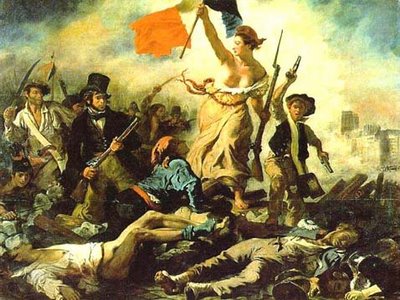Reform and Terror
Throughout the night of August 4, 1789, noblemen made grand speeches, declar-ing their love of liberty and equality. Motivated more by fear than by idealism,they joined other members of the National Assembly in sweeping away the feu-dal privileges of the First and Second Estates, thus making commoners equal tothe nobles and the clergy. By morning, the Old Regime was dead. The Rights of Man Three weeks later, the National Assembly adopted a statement of revolutionary ideals, the Declaration of the Rights of Man and of the Citizen.Reflecting the influence of the Declaration of Independence, the document statedthat “men are born and remain free and equal in rights.” These rights included“liberty, property, security, and resistance to oppression.” The document alsoguaranteed citizens equal justice, freedom of speech, and freedom of religion.In keeping with these principles, revolutionary leaders adopted the expression“Liberty, Equality, Fraternity” as their slogan. Such sentiments, however, did notapply to everyone. When writer Olympe de Gouges (aw•LIMP duh GOOZH) pub-lished a declaration of the rights of women, her ideas were rejected.
 Later, in 1793,she was declared an enemy of the Revolution and executed. A State-Controlled Church Many of the National Assembly’s early reforms focused on the Church. The assembly took over Church lands and declared thatChurch officials and priests were to be elected and paid as state officials. Thus,the Catholic Church lost both its lands and its political independence. The rea-sons for the assembly’s actions were largely economic. Proceeds from the sale ofChurch lands helped pay off France’s huge debt.The assembly’s actions alarmed millions of French peasants, who were devoutCatholics. The effort to make the Church a part of the state offended them, even though it was in accord with Enlightenment philosophy. They believed that thepope should rule over a church independent of the state. From this time on, manypeasants opposed the assembly’s reforms. Louis Tries to Escape As the National Assembly restructured the relationship between church and state, Louis XVI pondered his fate as a monarch. Some of hisadvisers warned him that he and his family were in danger. Many supporters of themonarchy thought France unsafe and left the country. Then, in June 1791, the royalfamily tried to escape from France to the Austrian Netherlands. As they neared theborder, however, they were apprehended and returned to Paris under guard. Louis’sattempted escape increased the influence of his radical enemies in the governmentand sealed his fate
Later, in 1793,she was declared an enemy of the Revolution and executed. A State-Controlled Church Many of the National Assembly’s early reforms focused on the Church. The assembly took over Church lands and declared thatChurch officials and priests were to be elected and paid as state officials. Thus,the Catholic Church lost both its lands and its political independence. The rea-sons for the assembly’s actions were largely economic. Proceeds from the sale ofChurch lands helped pay off France’s huge debt.The assembly’s actions alarmed millions of French peasants, who were devoutCatholics. The effort to make the Church a part of the state offended them, even though it was in accord with Enlightenment philosophy. They believed that thepope should rule over a church independent of the state. From this time on, manypeasants opposed the assembly’s reforms. Louis Tries to Escape As the National Assembly restructured the relationship between church and state, Louis XVI pondered his fate as a monarch. Some of hisadvisers warned him that he and his family were in danger. Many supporters of themonarchy thought France unsafe and left the country. Then, in June 1791, the royalfamily tried to escape from France to the Austrian Netherlands. As they neared theborder, however, they were apprehended and returned to Paris under guard. Louis’sattempted escape increased the influence of his radical enemies in the governmentand sealed his fate

